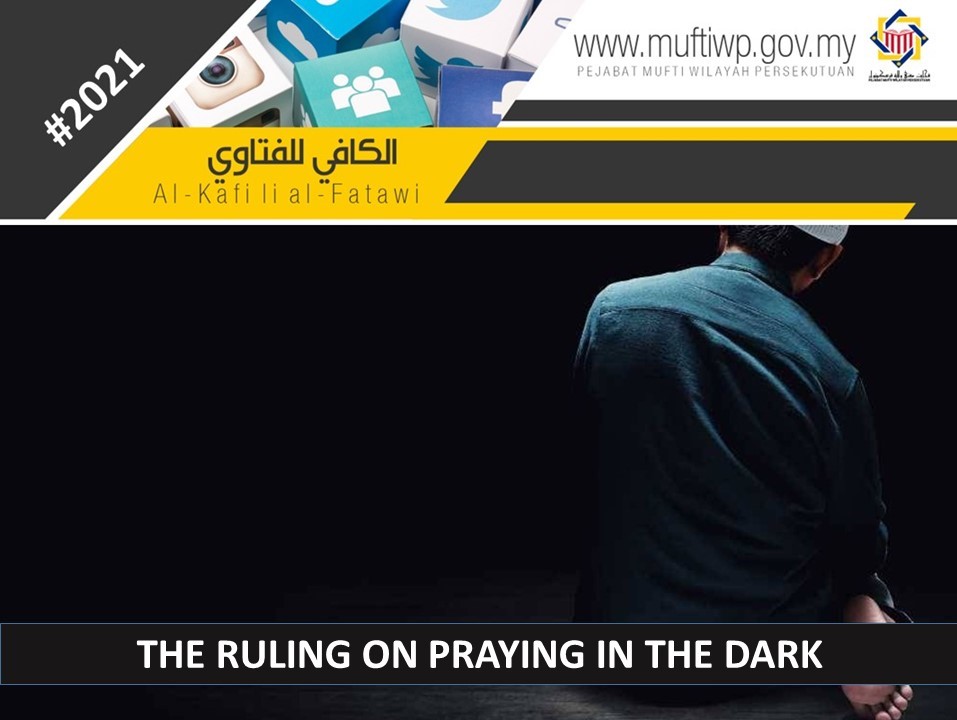
QUESTION
What is the ruling on praying in the dark?
ANSWER
It is permissible to pray in the dark as long as it does not affect one's concentration (khushu'). What's important is ensuring the qiblah is correctly faced, wearing clothing that properly covers the aurah, and the place of prayer is clean and free from impurities (najasah).
If complete darkness causes fear or distraction, it’s advisable to have some dim lighting to help maintain concentration and peace of mind during the prayer.
EXPLANATION
Performing prayer in the absence of light is permissible, as it was common during the time of the Prophet Muhammad SAW and his companions. This was simply due to the fact that homes at the time did not have lamps or artificial lighting. In a hadith narrated by Aisyah RA, she said:
كُنْتُ أَنَامُ بَيْنَ يَدَيْ رَسُولِ اللَّهِ صَلَّى اللهُ عَلَيْهِ وَسَلَّمَ وَرِجْلَايَ فِي قِبْلَتِهِ فَإِذَا سَجَدَ غَمَزَنِي، فَقَبَضْتُ رِجْلَيَّ، فَإِذَا قَامَ بَسَطْتُهُمَا، قَالَتْ: وَالبُيُوتُ يَوْمَئِذٍ لَيْسَ فِيهَا مَصَابِيحُ
Meaning: "I used to sleep in front Allah's Messenger SAW and my legs were opposite his qiblah and in prostration he pushed my legs and I withdrew then and when he stood, I stretched them. "In those days the houses were without lamps."
(Narrated by al-Bukhari)
This hadith shows that the Prophet Muhammad SAW performed prayers in unlit spaces simply because homes in those days did not have any lamps or lighting. It was a natural part of their environment, not a specific practice done for religious emphasis.
However, praying in a dark or dimly lit space may help some people improve their focus and concentration (khushu’). In such cases, it can be encouraged as long as it does not cause fear or distraction. Allah SWT says:
قَدۡ أَفۡلَحَ ٱلۡمُؤۡمِنُونَ (١) ٱلَّذِينَ هُمۡ فِي صَلَاتِهِمۡ خَٰشِعُونَ (٢)
Meaning: Certainly will the believers have succeeded: They who are during their prayer humbly submissive.
Surah al-Mu’minun (1-2)
Nevertheless, even in darkness, it remains recommended (sunnah) for one to keep their gaze directed toward the place of prostration and to avoid looking elsewhere. This is because focusing on the place of prostration helps the worshipper attain deeper concentration (khushu') in any situation.
When praying in a dark room, it must be ensured that the prayer is performed while facing the correct qiblah, wears clothing which adequately covers the aurah and the prayer area is free from any form of impurity (najasah). In addition, the darkness must not cause discomfort or fear that could distract the prayer and one's concentration. If such conditions occur, it is better to perform the prayer in a brighter area.
CONCLUSION
It is permissible to pray in the dark as long as it does not affect one's concentration (khushu'). What's important is ensuring the qiblah is correctly faced, wearing clothing that adequately covers the aurah, and the place of prayer is clean and free from impurities (najasah).
It is advisable for the prayer space to have at least minimal lighting such as a dim lamp as to preserve composure and focus during prayer. A state of complete darkness which compromises one's serenity and presence of mind may not only reduce the quality of devotion but potentially affect the validity of the prayer.

